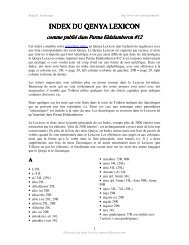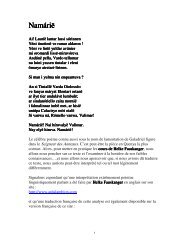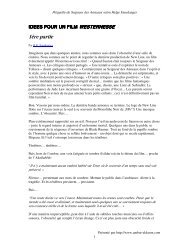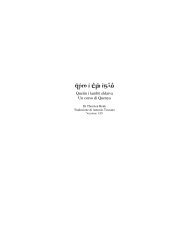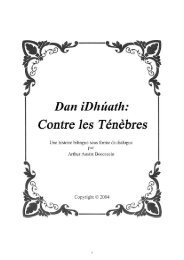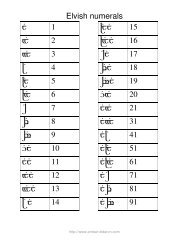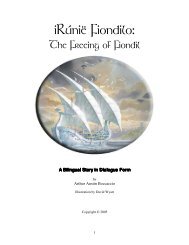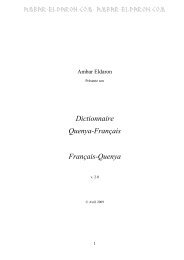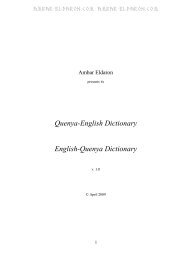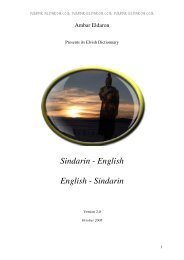Quenya Reverse Wordlist - Ambar Eldaron
Quenya Reverse Wordlist - Ambar Eldaron
Quenya Reverse Wordlist - Ambar Eldaron
You also want an ePaper? Increase the reach of your titles
YUMPU automatically turns print PDFs into web optimized ePapers that Google loves.
Helge K. Fauskanger http://www.uib.no/People/hnohf/<br />
eileuqraN Narquelië tenth month of the<br />
year, "October" (Appendix D); the word seems to<br />
mean "Fire-waning", "Sun-waning". Compare<br />
narquelion ("q"), q.v.<br />
eilleleT Telellië "Teler-folk" (TELES)<br />
eimiaT Taimië, Taimë "the sky" (LT1:268;<br />
rather menel in mature <strong>Quenya</strong>)<br />
eimla almië "blessedness, 'blessings', good<br />
fortune, bliss" (GALA)<br />
eimreC Cermië seventh month of the year,<br />
"July" (Appendix D)<br />
ein nië "tear" (NEI, LT1:262, LT2:346);<br />
apparently níe in MC:221<br />
einássam massánië "breadgiver", used as a<br />
title of the highest woman among any Elvish people,<br />
since she had the keeping and gift of the coimas<br />
(lembas). Also translated simply "Lady" (PM:404)<br />
einatniT Tintanië "Kindler" = Varda (TIN;<br />
Tintánië under TAN)<br />
eináv vánië an augmentless perfect of auta-<br />
(q.v.) that may occur in verse; regular form avánië<br />
(WJ:365)<br />
eináva avánië, pl. avánier perfect tense of<br />
auta-, q.v. (WJ:365)<br />
einédudlA Aldudénië "Lament for the Two<br />
Trees" (a strange word, since <strong>Quenya</strong> does not permit<br />
intervocalic d as in this word - perhaps the Vanyarin<br />
dialect of <strong>Quenya</strong> did) (Silm)<br />
einemoy yomenië "meeting, gathering" (of<br />
three or more coming from different directions)<br />
(WJ:407)<br />
einev venië "shape, cut" (prob. noun)<br />
(LT1:254)<br />
einif finië "cunning" (prob. noun)<br />
(LT1:253)<br />
einnavaY Yavannië name of the ninth<br />
month of the year, "September" (Appendix D,<br />
SA:yávë)<br />
einras sarnië "shingle, pebble-bank"<br />
(UT:463)<br />
einrom mornië "darkness" (Nam,<br />
RGEO:67). Early "Qenya" also has Mornië "Black<br />
Grief", "the black ship that plies between Mandos and<br />
Erumáni" (LT1:261). This is probably a compound<br />
mor- "black" and nië "tear".<br />
einúdnA Andúnië (apparently a variant form<br />
of andúnë) (place-name, a city and port on the<br />
western coast of Númenor, said to mean "sunset").<br />
(Appendix A, Silm, UT:166, NDÛ)<br />
eir rië "crown" (RIG)<br />
eira arië "daytime" (AR 1 )<br />
eirám márië "it is good" (FS; from mára<br />
"good"; the stative-verb suffix -ië is hardly valid in<br />
mature <strong>Quenya</strong>)<br />
eiramA Amarië (fem. name; perhaps<br />
derived from mára "good") (Silm)<br />
25<br />
eiráman namárië "farewell" (Nam,<br />
RGEO:67)<br />
eiráN Nárië sixth month of the year, "June"<br />
(Appendix D); derived from the stem (a)nar- having<br />
to do with fire or sun.<br />
eirát tárië "height", allative tárienna "to<br />
[the] height" (LotR3:VI ch. 4, translated in<br />
Letters:308)<br />
eiratnauQ Quantarië "Day of Completion,<br />
Oldyear's Day" (PM:127) (= the quantien of the<br />
Etymologies)<br />
eirayniV Vinyarië "Newyear's Day"<br />
(PM:127)<br />
eirev verië "boldness" (BER)<br />
eiriaf fairië "freedom" (LT1:250)<br />
eiríminraC Carnimírië "Red-jewelled", the<br />
rowan-tree in Quickbeam's song (LotR2:III ch. 4,<br />
SA:caran), also translated "with adornment of red<br />
jewels" (Letters:224; where the reading "carnemírie"<br />
occurs)<br />
eiródniL Lindórië fem. name, perhaps<br />
*"She that arises in beauty" (compare Melkor "He<br />
that arises in Might") (Silm). Cf. linda.<br />
eirón #nórië "country", in sindanórië (see<br />
sinda) (Nam, RGEO:67)<br />
eisíh hísië "mist" (Nam, SA:hîth); also hísë.<br />
eissalo olassië "collection of leaves, foliage"<br />
(Letters:283)<br />
eisua ausië "wealth" (LT2:336)<br />
eit tië "path, course, line, direction, way"<br />
(TE3); pl. tier in Namárië (Nam, RGEO:67);<br />
tielyanna "upon your path" (UT:22 cf. 51; tie-lyanna<br />
"path-your-upon")<br />
eitál látië "openness" (VT39:23)<br />
eithapauqa aquapahtië "privacy" (literally<br />
*"fully-closedness", of a mind that closes itself<br />
against telepathic transfers) (VT39:23)<br />
eitnalat talantië "he is fallen" (FS; see -ië #2<br />
concerning the doubtful authority of this stative verb<br />
ending in mature <strong>Quenya</strong>)<br />
eitnalata atalantië "Downfall", said to be a<br />
normal noun-formation in <strong>Quenya</strong> (Letters:347).<br />
eitnemo omentië "meeting" (meeting or<br />
junction of the directions of two people) (WJ:367),<br />
*omentielva "our meeting", only attested in the<br />
genitive: omentielvo "of our meeting". See -lva.<br />
Concerning the alternative reading omentielmo, see -<br />
lma.<br />
eitsewgnet tengwestië "Language" as<br />
abstract or phenomenon (WJ:394)<br />
eiuqne enquië Eldarin six-day week, pl.<br />
enquier (Appendix D)<br />
eiv vië "manhood, vigour" (WEG)<br />
eiváy yávië "autumn" (SA:yávë); "autumn,<br />
harvest", in the calendar of Imladris a precisely<br />
defined period of 54 days, but also used without any<br />
Presented by http://www.ambar-eldaron.com



